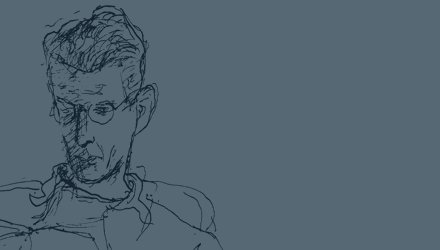
DG: First of all he would have been astonished to learn the number of letters he had sent over his long life. It is clear that when he entrusted Martha Fehsenfeld with editing his correspondence he had no notion of the scale of the task that lay ahead. This is the more understandable when one realises that replying to letters was just one of the things he did, diligently, almost very day.
What becomes clear in Volume IV is that in the late years of his life Beckett’s attitude to posterity changed. Up until then he had always resisted biographers and resisted any attempt to publish his letters. By the mid-1980s, as he realised that his letters were going to be made public in some form or other whether he liked it or not, he decided to put someone in charge whom he trusted; equally with biography, where previously he had resisted, in the end he relented and authorised James Knowlson to write the biography.
Barbara Bray once informed me that Beckett had told her that he “didn’t give a damn” what happened to his letters “after he was dead”. That said, I like to think that he might be pleased by the fact that so many readers have taken pleasure and found insight in this aspect of his writing. I’ve no doubt he would have turned up some faults in our notes since, despite his asseverations to the contrary, he remained until the end of his life a very acute critic endowed with all the range of reference one might expect of a very senior academic – and more. I believe in any case he would have been cheered to see that a serious attempt had been made to give his letters context, and I am certain he would have appreciated the extraordinary translations of his French letters that have been done by George Craig. I recently chaired an event with the great Irish novelist John Banville, who, speaking of George’s translations, said that it was as if Beckett had invented his “ideal translator”. To a man such as Beckett, for whom the relation between his primary two languages, English and French, was so crucial, the fact that his French voice has passed so beautifully into English would surely have mattered.
As I have mentioned, the letters belie the image that Beckett may still have in the popular imagination – an image encouraged by photographs of him, especially in old age – as being someone cut off from the world and its everyday pressures and concerns.
As I have mentioned, the letters belie the image that Beckett may still have in the popular imagination – an image encouraged by photographs of him, especially in old age – as being someone cut off from the world and its everyday pressures and concerns.
Of course I do indeed believe that the letters offer insight into the many aspects of Beckett’s personality and motivations, his desires, his passions, his repulsions. They let us see, for example, that far from being the apolitical writer he is sometimes represented as being, he was in fact very taken up by current events, and that he intervened in them when he thought he could make a difference. There is, in Volume IV, a moving exchange of letters between him and Václav Havel, after the latter learns that the former has written a play for him and had it performed at the Avignon festival. There is a letter to the Spanish court that is about to try his fellow-playwright Fernando Arrabal, a letter in which he deploys the most surprising argument – surprising for someone for whom literature is defiant of nations and nationalities (but not so surprising when one understands that he is trying to win the court round to clemency). One sees his unabated sympathy for those who have been incarcerated, when, over the last fifteen years of his life, he supports the former inmate of San Quentin prison, the actor Rick Cluchey. One sees how he never tires of helping out his friends, whether financially or through an appreciation of their work. There is a lovely letter to one of his favourite novelists, Robert Pinget, in which he scolds him for being taken up with prizes and other such distractions, and practically orders him to get back to work.
This may be what one learns most wonderfully through Beckett’s letters: the sheer generosity of the man. It is wonderful – and instructive – to witness how, when he fails in his attempt not to win the Nobel Prize for Literature, he finds a way of minimising the impact of the fame and the money on his life. He regularly describes himself as a “low-church Protestant”. This may seem a surprising remark from a writer who never misses a chance to heap scorn and opprobrium upon religion. What he usually means is that he believes in the salutary value of hard work.
In August I was talking about Beckett at the Edinburgh International Book Festival, and in the Q&A session that followed a member of the audience posed a question that caught me off guard. She asked what, in the end, were the “ethics” of Beckett as revealed in his letters, what were his “values”. I had to think fast!
What I managed to invoke were precisely these two values: the importance of friendship and the importance of hard work. Given that so many of his plays and novels deal with characters who are isolated or who appear miserable in their relationships, and given the unrelenting focus upon failure, indigence, and passivity, that these should emerge from Beckett’s letters as two abiding values was something of a revelation to me.
Latest Comments
Have your say!